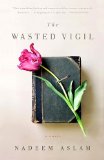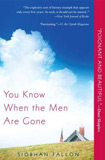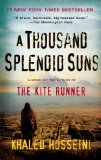Summary | Excerpt | Reading Guide | Reviews | Beyond the book | Read-Alikes | Genres & Themes | Author Bio

To enter Nadeem Aslam's world is to enter a darker, more perfectly
rendered world than our own. Here, cemeteries are 'bone forests,'
night insects have knees and elbows of 'finest wire,' memories rise
'like bruises' and the mountains ripple like 'sapphire water.' The
characters that inhabit this world are also deftly drawn, and they
echo familiar people and situations. Yet, they are distinctly
different; each character is a stereotype unwrapped, a mysterious
personality revealed. What we think we know about Aslam's characters
in the beginning, we learn by the end is merely superficial.
The Wasted Vigil explores the relationship between six tragic
people in Afghanistan. Marcus, Lara, David, Casa, Dunia, and James
come together in Marcus's house to wait. Each is searching for
something, but as the title suggests, they will ultimately wait in
vain. Employing irony and flashback, Aslam delicately reveals the
deep ties connecting these characters. As the six interact, they
grow into a type of family as they each become the replacement for
someone important in another's life. The hatred they are supposed to
have for each other – Casa should hate David for being American,
Marcus should hate Lara for being Russian– begins to disappear. It
doesn't completely leave, we watch the characters struggle with
their perceptions of 'the other,' but we see the internal discussion
and this opens up a larger rumination on the function of stereotype
and the power of prejudice. Even Casa, the heartless terrorist, the
creature who vows to destroy America, becomes human as we watch him
help David build a birch-bark canoe or wonder where his mother
is; and when we learn of the abject abuse that was leveled on him as
a child in a madrassa, we begin to feel deep pity for him. Aslam's
ability to reveal the complex qualities in all his characters is one
of this novel's strengths.
The story and relationships unfold against the backdrop of Marcus's
house, a beautiful six room dwelling near a lake outside of Usha, a
town targeted by terrorists. Each room is painted with gorgeous
murals of Allah's bounty, but it is also a chilling reminder of
Marcus's losses and the plague of the Taliban. His wife, Quatrina,
who became insane after severe Taliban brutality, chose to save her
library by bolting each book to the ceiling. To read a novel, one
must pull a book from the ceiling and imagine the word that was
blotted out by the nail's hole. This poignant image of books being
saved through partial destruction resonates through the plot and the
characters: all good things must be partially destroyed to survive
the nightmares in this country. In total, the house represents the
degradation of classical Islam, a theme that Aslam investigates
throughout the novel. When Casa finds a severed head in the
large box full of Quatrina's 99 paintings of Allah, we have a
crystalline, horrific, and powerfully juxtaposed example of the
delicate beauty of classical Islam and the deathly fanaticism that
has wormed its way into the faith.
Aslam explores a variety of themes and historical moments as he
strives to illustrate 'the continuation of wars' and the connections
between these unlikely friends. The notion that fighting, whether
internal or external, between friends or amongst nations, can ever
be resolved is adroitly examined as Aslam walks with these
characters through their pain and searching. His beautiful language,
precise imagery, and nuanced characterization add to the rich
experience of reading this book. As with Aslam's other work, the
plot is subtle and the action spurred largely by character
development, but this is a beautiful, powerful book, one that should
make us think about the ways we perceive other people.
Nadeem Aslam was born in 1966 in Pakistan and now lives in
North London. He moved to England at 14 when his father, a communist
and a supporter of the Soviet invasion of Pakistan, decided to flee
the country with his family. Aslam studied biochemistry at
Manchester University before pursuing writing. He wrote his first
short story in the Urdu language for a Pakistani newspaper at age
13. His first novel, Season of Rainbirds (1993), was
critically acclaimed and won the Betty Trask Award, the Authors'
Club First Novel Award, and was shortlisted for the Mail on
Sunday/John Llewellyn Rhys Prize and the Whitbread First Novel
Award. His second novel, Maps for Lost Lovers (2005),
took eleven years to write. Set in a small town in England about
Pakistani immigrants, it won Aslam international recognition, the
Encore Award and the Kiriyama Pacific Rim Book Prize.
Aslam's latest novel, The Wasted Vigil, was written in seven
months. During the time in which he was writing, he saw no one. His
family brought him food while he was sleeping. In appreciation, he
dedicated the novel to his sister and brother-in-law for their
support. The title of the novel is derived from a painting by
Pakistani artist Abdur Rahman Chugtai (1894-1975) with the same
name. Aslam remarks on the connection between his novel and the
painting, in which a well-dressed, smiling, hopeful woman sits
waiting, saying "the artist and God knows that it ain't gonna
happen. So once you look at the title, it's quite a chilling
picture."
Aslam believes that "the novelist's job is not to pose solutions,
but to find out how best to live. That is the intention in each of
my books." As with all Aslam's work, he begins with the mundane and
discovers the beauty and pain of everyday life. In The Wasted
Vigil, he started with a group of people with opposing
ideological backgrounds and put them together. "I wanted to write
about how friends become family," he says.
![]() This review was originally published in The BookBrowse Review in September 2008, and has been updated for the
October 2009 edition.
Click here to go to this issue.
This review was originally published in The BookBrowse Review in September 2008, and has been updated for the
October 2009 edition.
Click here to go to this issue.

If you liked The Wasted Vigil, try these:

You Know When the Men Are Gone
by Siobhan Fallon
Published 2012
Reminiscent of Raymond Carver and Tim O'Brien, an unforgettable collection of interconnected short stories.

by Khaled Hosseini
Published 2008
At once an incredible chronicle of thirty years of Afghan history and a deeply moving story of family, friendship, faith, and the salvation to be found in love.
Your guide toexceptional books
BookBrowse seeks out and recommends the best in contemporary fiction and nonfiction—books that not only engage and entertain but also deepen our understanding of ourselves and the world around us.